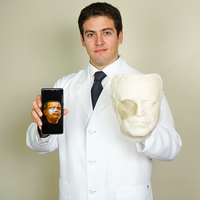The
prevalence of obesity has increased so dramatically in recent years that it is
of epidemic proportions. According to the World
Health Organization, every year around 2.8 million people die because of
obesity, and, in 2016, it affected more than 340 million children and
adolescents between the ages of 5 and 19. Changes in lifestyle, physical
inactivity, and diets that are increasingly calorific are factors that have
caused the prevalence of obesity to almost
triple since 1975. Furthermore, obesity dramatically increases the risk of
developing other diseases, such as diabetes and non-alcoholic steatohepatitis.
While
studying for his doctorate degree in Pharmacology and Endocrinology at the
University of Copenhagen (Denmark), the human biologist Alexander Hovard
Sparre-Ulrich was a part of the team that discovered a possible weapon to use
in the fight against this 21st-century problem. The young man and his team
discovered a naturally occurring peptide-antagonist of the GIP receptor
(glucose-dependent insulinotropic polypeptide), a hormone system whose
"activity in the body is correlated with being more overweight,"
explains Sparre-Ulrich. For this reason, antagonizing the GIP receptor (i.e.
finding a substance that causes the opposite effect) could induce weight loss
and mitigate metabolic disorders related to excessive food-intake. Thanks to
this discovery, the Danish researcher has become one of the winners of Innovators
Under 35 Europe 2018 from MIT Technology Review.
When
Sparre-Ulrich realised the potential of his discovery to create new treatments,
he began to seek funding and support.In 2017, he co-founded Antag Therapeutics
and has been running the company as the CEO since then. The young man explains:
“We use this naturally occurring antagonist to understand how the GIP system
contributes to the development of obesity and type 2 diabetes through human
intervention studies. Moreover, we are conducting human studies to explore the
potential of antagonizing the GIP receptor in an orphan indication”.
The
word 'natural' is key in this research, as it allowed Sparre-Ulrich to validate
his novel approach in human studies. The researcher confirms: “What makes our
project unique is that, despite being at such an early stage, we can assess the
biological consequences of antagonizing the GIPR in both healthy humans and
patients". This is how he has been able to demonstrate its important
effects on the metabolism.
One
of the issues of working with small peptides is their short half-life. The
naturally occurring antagonist has a half-life of 7.5 minutes. So Antag Therapeutics has developed a
GIP receptor antagonist with a half-life of "29 hours measured in pigs,
which in humans will enable once-weekly dosing and makes the treatment much
more convenient for patients," says Sparre-Ulrich.
At
the moment, his project is in a preclinical phase in which they are studying
the validity in different metabolic diseases, and later they will "move on
to clinical development". Despite its embryonic state, Sparre-Ulrich and
his team’s discovery also won the University of Copenhagen Innovation
Prize in 2017.
For
Héctor García Martín, quantitative metabolic modeling director at Lawrence Berkeley National Laboratory and a member of the jury for Innovators Under 35 Europe 2018,
it is "an excellent project with a large potential impact, that is gaining
a lot of ground". Another member of the jury, Nuno Arantes-Oliveira, healthcare executive and entrepreneur at Arantes Saúde,
agrees and adds that the initiative "responds to a very important need in
a field where positive disruption is very welcome".
By Patricia R. Guevara
Translation: Lisa Rushforth




